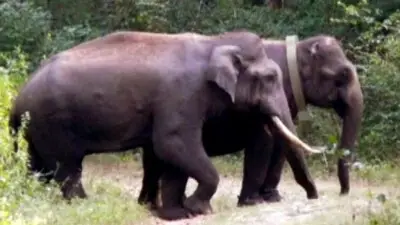The Tripura Forest Department has taken proactive steps to address the ongoing human-elephant conflict in the Khowai District by initiating the installation of radio collars on three troublesome elephants. Responding to the concerns raised by local residents regarding the frequent encounters with wild elephants in the villages, the forest department has swiftly moved to implement this preventive measure.
The installation of radio collars on the elephants is part of a larger strategy aimed at closely monitoring their movements and behavior. By tracking the elephants’ whereabouts in real-time, forest officials can better anticipate their movements and take timely action to prevent potential conflicts with humans.
The decision to collar these specific elephants comes after they were identified as the primary instigators of the recent incidents of human-elephant conflict in the region. These elephants have been known to stray into agricultural fields, destroy crops, and pose a threat to the safety of villagers, prompting urgent intervention from authorities.
The radio collars, equipped with GPS tracking technology, will provide valuable data on the elephants’ movements, allowing forest officials to map their routes and identify patterns of behavior. This information will enable the implementation of targeted measures to mitigate potential conflicts, such as alerting villagers in advance of the elephants’ approach and guiding them away from populated areas.
Moreover, the installation of radio collars on the elephants underscores the forest department’s commitment to adopting innovative solutions to address wildlife conservation challenges while ensuring the safety and well-being of local communities. By leveraging technology to monitor and manage human-wildlife interactions, authorities aim to strike a balance between wildlife conservation and human livelihoods.
The initiative to collar the troublesome elephants is part of a broader strategy that includes community engagement, habitat restoration, and the implementation of sustainable agricultural practices. Through collaborative efforts involving government agencies, local communities, and conservation organizations, Tripura aims to foster coexistence between humans and elephants while safeguarding biodiversity and ecological integrity.
As the installation of radio collars progresses, forest officials remain vigilant and proactive in their efforts to prevent further conflicts between humans and elephants. By addressing the root causes of human-elephant conflict and implementing effective mitigation measures, Tripura seeks to create a harmonious coexistence between humans and wildlife in the region.

